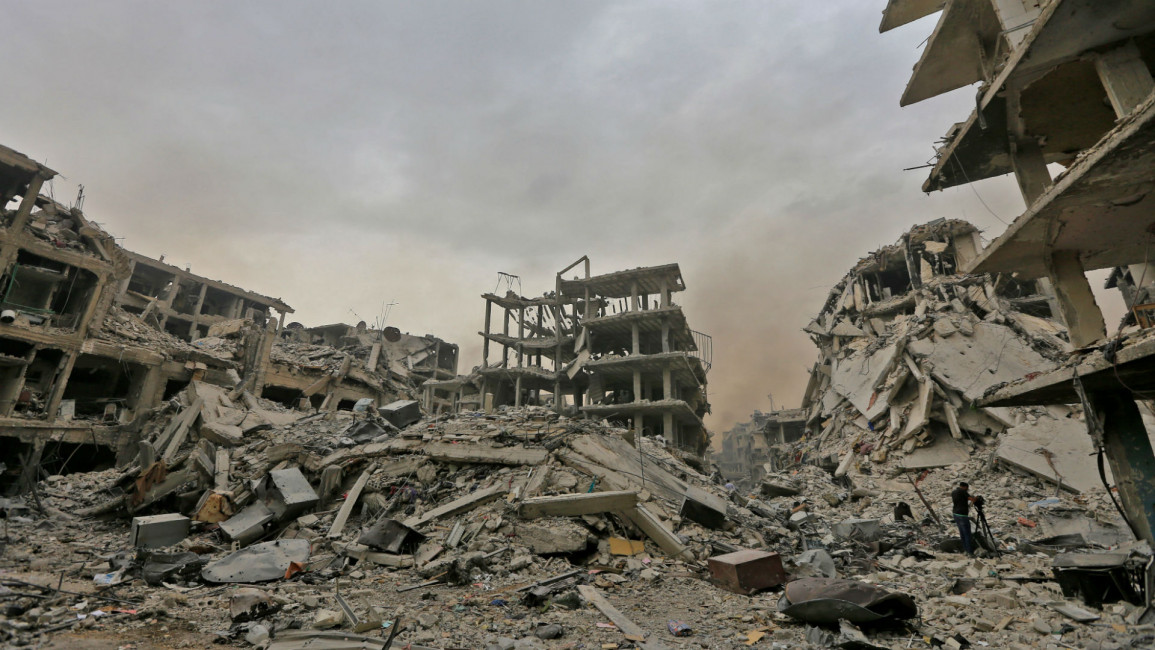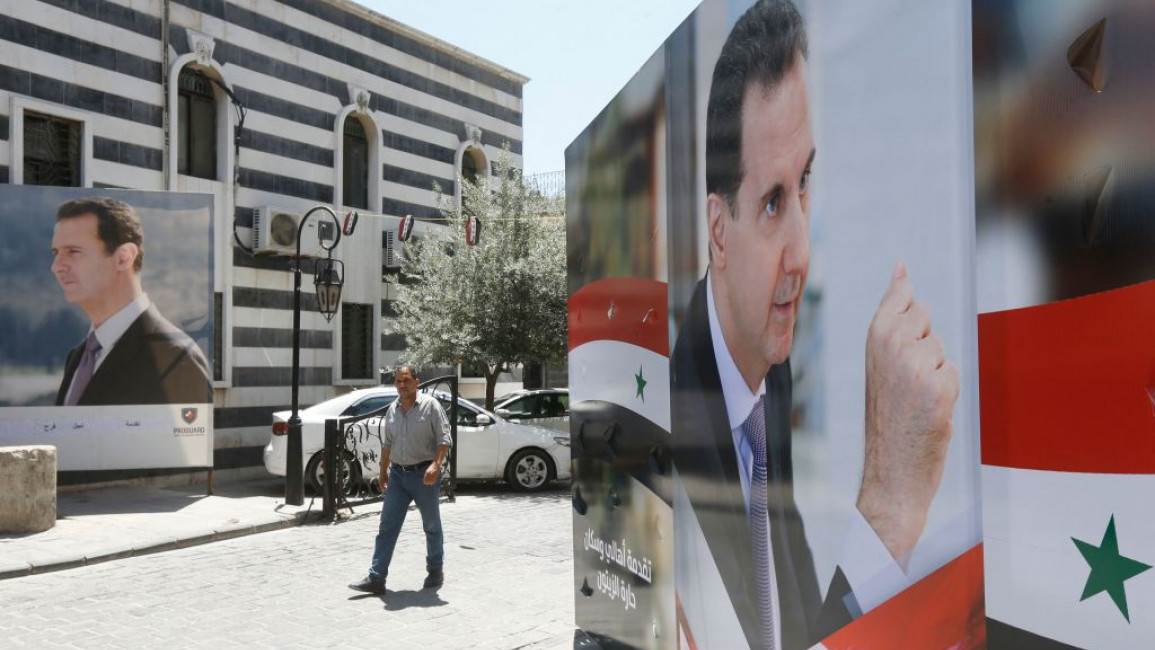
What Raisi's Damascus visit means for Iran-Syria ties

Iranian President Ebrahim Raisi visited Syria last week, the first such visit by an Iranian president since 2010. He met Syrian President Bashar al-Assad, discussed strengthening bilateral relations, and signed 15 cooperation documents on economic ties.
The Iranian president dubbed his trip a "turning point" in Iran-Syria relations, and one of his deputies hailed it as a sign of Tehran's "strategic victory in the region".
But why did Iran choose the present moment to send Raisi to Damascus, and what was the main aim and message of his visit?
The devastating 6 February earthquake that devastated large parts of Syria and Turkey saw several regional countries extend a helping hand to Damascus and begin restoring long-suspended diplomatic relations.
"Iran has spent billions on keeping Assad's regime afloat, and I imagine the rulers of Tehran feel that it's time to secure their gains"
Assad had been widely shunned over his brutal crackdown against the popular uprising that started in 2011 against his regime and his violent conduct in the ensuing civil war, which has lasted over a decade and killed an estimated 500,000 people.
The subsequent China-brokered peace deal between Iran and Saudi Arabia saw Riyadh move toward a rapprochement with Damascus, and Arab states on Sunday agreed to reinstate Syria’s membership in the Arab League after being suspended over 10 years ago. Turkey also wants to mend fences with its southern neighbour.
Aside from being brought in from the cold, Assad may hope he can parlay changing attitudes toward his regime into much-needed investment, especially from the wealthy Gulf states, and assistance with reconstruction.
It's against this backdrop that Raisi made his landmark trip to Damascus. Unlike most Arab states, Iran stood by Assad throughout the lengthy civil war, providing thousands of fighters and billions of dollars to prop up his regime. Raisi's visit could, therefore, be interpreted as a message from Tehran that it wants some kind of a return on its investment.
Barbara Slavin, a distinguished fellow at the Stimson Center in Washington and founder and former director of the Future of Iran Initiative at the Atlantic Council, believes the visit is more a “victory lap” than a trip aimed at competing with Gulf states for reconstruction projects.
"The fact that Saudi Arabia has now shown its desire for Syria to be readmitted to the Arab League recognises that Assad is not going anywhere and that the Iranian-Russian campaign to keep him in power succeeded," Slavin told The New Arab.
Nevertheless, there is still a long way to go to ease Assad's "pariah status" since US sanctions against his regime remain a "major impediment" for companies that do business in the West to either trade with or invest in Syria.
"As a fellow pariah, Iran is perhaps better placed to get contracts," Slavin said. "But Tehran has an overriding interest in Syria recovering and is also confident that Syria will stay politically and strategically aligned to Iran."
|
|
Aron Lund, a fellow with Century International, doubts the timing of Raisi's visit was merely coincidental.
"It's always been hard to tell what goes on under the hood in the Syrian-Iranian relationship, but the timing of Raisi's visit seems linked to the Syrian-Arab normalisation process, which is now in full swing," Lund told The New Arab.
He recalled how "things really picked up after the earthquake", with humanitarian efforts and post-earthquake diplomacy producing a series of meetings and phone calls with governments already exploring the prospect of normalisation seizing the opportunity to contact Damascus.
"Most importantly, the Saudis joined the pro-normalisation camp, and that really seems to have tipped the scales in the Arab World," Lund said. "Syria's foreign minister, Faisal Mekdad, was recently invited to meet with several counterparts in Jeddah, and then in Amman."
Syria's readmittance on Sunday to the Arab League could now pave the way for Assad to attend a summit in Saudi Arabia on 19 May.
"There's also a political dimension to the visit, in the sense that it shows that Syria's relationship with Iran remains healthy and strong and is not threatened by Syrian-Arab normalisation"
Despite this flurry of diplomacy, Lund doubts that the Arab oil states could even "hope to rival" Iranian influence over Syria.
"They certainly can't compete in the security sphere, where Syria is really joined at the hip with Iran," he said.
At the same time, the Gulf states have "a lot of money to spend", and Syria is in the throes of a deep economic crisis. Furthermore, these states are "well placed" to buy influence and assets at the "fire-sale market that is Syria's economy" if they can circumvent US sanctions on Damascus.
"Iran has spent billions on keeping Assad's regime afloat, and I imagine the rulers of Tehran feel that it's time to secure their gains" before Arab Gulf states swoop in, Lund said.
"There's also a political dimension to the visit, in the sense that it shows that Syria's relationship with Iran remains healthy and strong and is not threatened by Syrian-Arab normalisation," he added. "In a joint statement issued by the two presidents, they were very upbeat about the regional thaw, citing both the improving Syrian-Arab ties and the recent Chinese-brokered Iranian deal with Saudi Arabia."
In many ways, having the Gulf states normalise ties with Syria and invest in the country will benefit Iran since it will "fortify Assad's position" and make him a "less costly client for Iran to prop up" over time.
"But of course, there will be aspects of the Syrian-Iranian relationship that the Iranians worry about, perhaps especially in the economic field, since that's where the Arab Gulf states have real muscle," Lund said.
Aside from signing multiple economic deals, Raisi also met senior officials from Hamas and Islamic Jihad during his trip. They discussed the situation in the occupied West Bank, East Jerusalem, and Gaza Strip, where Israeli violence markedly increased in April. Raisi emphasised the importance of "unity and cohesion of the resistance forces" to defeat Israel, the collapse of which he predicted "to be very close".
|
|
Iran refers to the Palestinian groups it backs and Hezbollah in Lebanon as the ‘axis of resistance’ against Israel. Syria has long been a vitally important country for Iran's support of these groups, given its proximity to Israel and Lebanon.
Slavin believes Tehran will continue using Syria "as a conduit” to Hezbollah, Hamas, and Islamic Jihad.
This axis is "looking especially robust because of the recent domestic turmoil in Israel and the growing Israeli confrontation with the Palestinians," she said.
Lund noted that the axis has exhibited clear strengths and weaknesses, having "weathered the past decade" of divisions and the Syrian conflict.
"They're a bit bruised, but they're still standing. With the return of Hamas to the fold, they're still united - or rather, they're united once again," he said.
They aren’t necessarily doing well politically though, Lund said, as Arab normalisation with Israel has moved ahead and reconfigured regional politics to their disadvantage.
"Every member of the Iran-led alliance suffers one way or another in the domestic sphere," he added.
Paul Iddon is a freelance journalist based in Erbil, Iraqi Kurdistan, who writes about Middle East affairs.
Follow him on Twitter: @pauliddon



![President Pezeshkian has denounced Israel's attacks on Lebanon [Getty]](/sites/default/files/styles/image_684x385/public/2173482924.jpeg?h=a5f2f23a&itok=q3evVtko)



 Follow the Middle East's top stories in English at The New Arab on Google News
Follow the Middle East's top stories in English at The New Arab on Google News


